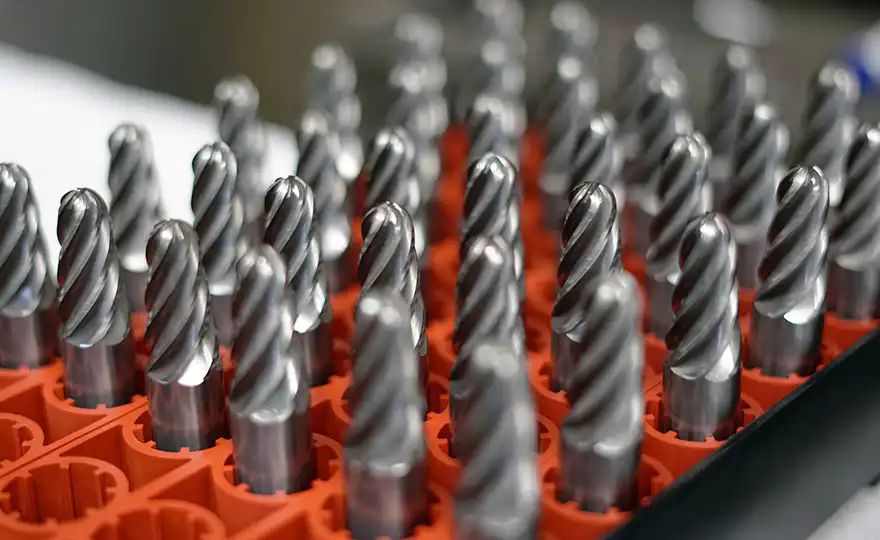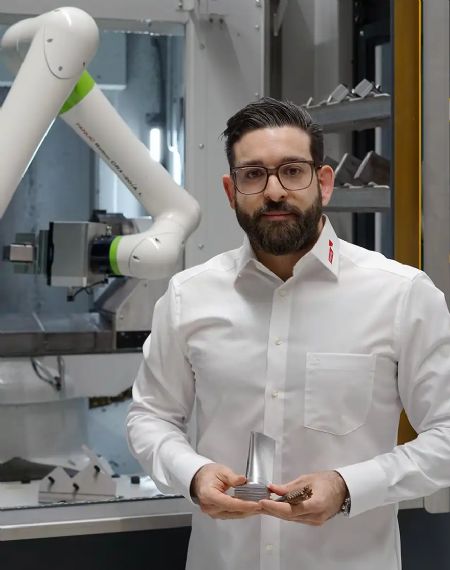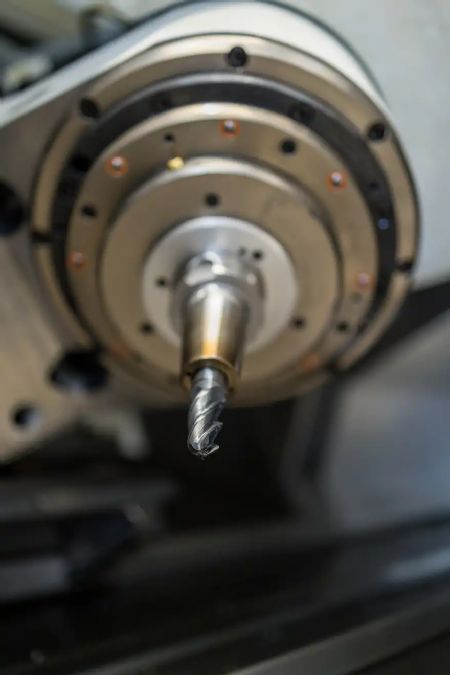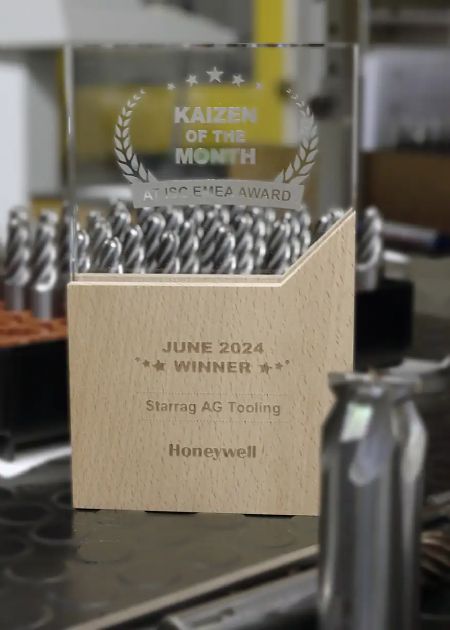 Barrel tools manufactured by StarragStarrag
Barrel tools manufactured by StarragStarrag provides a full range of manufacturing solutions, utilising components produced in-house as well as specialised tools. The high-quality Starrag machining centres are developed and manufactured in Rorschacherberg, Switzerland, for aircraft and turbine manufacturing. In addition, the company also offers a broader range of solutions from carbide tools and RCS CAM software for blades to clamping technology, fixture construction, automation solutions, and host computer technologies.
Sofian Regaz, Starrag sales manager for aerospace and turbine technology, (pictured right) said: “This ‘full package’ sets us apart from other suppliers. We do not see ourselves purely as a machine tool manufacturer, but as a solution provider for production processes in the aerospace and turbine sectors. This ranges from standalone machines to flexible manufacturing systems (FMS), which customers can obtain from us as a one-stop-shop.”

Mr Regaz (picrued right) is primarily responsible for product management and sales of Starrag tools. He continued: “Here in Rorschacherberg, we have spent many years developing and grinding carbide milling cutters for aircraft and turbine components made from difficult-to-machine materials such as titanium, Inconel and high-alloy steels.”
Although Starrag offers a small range of standard tools, over 90% of them are custom-made products tailored to specific machining processes that fully embrace the component, the machine and the material. Mr Regaz continued: “It makes a huge difference whether I adapt my NC program to a catalogue milling cutter or design the tool in terms of the cutting edge length, corner radius, flank angle and coating. This enables us to deliver the optimum machining process and our customers enjoy great success with this.”
Starrag sells most of its machines as part of a manufacturing solution for a specific part or component family, so the corresponding specialist tools are usually supplied with them. This incorporates an explanation of why the tools are designed in a particular way and the expertise on which they are based. Mr Regaz explained: “The customer needs to know how their tools differ from catalogue tools and the impact these differences have. They also need to understand that the advantages of our tools cannot be found with other suppliers.”
This expertise is no coincidence. Starrag maintains a very close, partnership-based relationship with its customers and supports them throughout the production process and beyond the warranty period. Mr Regaz continued: “This means that if, for example, a component is due to be changed and the machine needs to be set up for a new process, we are still by our customer’s side to offer new customised tools as necessary.”
 Pictured left: a Starrag developed tool in operation
Pictured left: a Starrag developed tool in operationStarrag has a distinct advantage over traditional tool manufacturers. Tools are both developed and ground at the Rorschacherberg plant, which also houses the 2,000m
2 Aerospace and Turbine Competence Centre (ATCC) which is equipped with all the latest five-axis machining centres from the Starrag NB, LX, and STC series.
Mr Regaz added: “We use these machines for a wide range of our own trials and tests for our customers, as well as for developing and optimising processes and, of course, for our analyses and tool tests. We even take on small series production on behalf of customers.”
For the tool team, this means they can reproduce the customer’s processes on original machines and optimise the tools before delivery. Time and again, customers confirm that this saves numerous transport routes and, in turn, a significant amount of time and money. Mr Regaz said: “If corrections to the tool are still necessary, we can react and adopt changes very quickly as we have our own grinding shop. We achieve incredibly quick response times, sometimes down to half a day.”
The ATCC is an important meeting place where Starrag technologists, machine operators, automation specialists, tool specialists, and customers come together. Starrag offers comprehensive support in programming the machines, managing processes, and optimising subsequent processes. For the tool team, this is a valuable source of expertise. Mr Regaz explained: “This is where we find out how the market is evolving, how materials are changing, what the blanks of the future will look like and what requirements components will have to meet. This allows us to get ahead of the game with our tool developments and offer our customers solutions early on.”
Starrag is also well-positioned worldwide in tool servicing. Starrag has partnered with
Oerlikon Balzers to save customers time and money by providing on-site regrinding and recoating services for Starrag in America and Asia. This is an important factor for Mr Regaz. He continued: “We offer a similar service in-house as well, but customers can save themselves the long journeys from overseas by using our partner offer. Customer feedback on our tools is consistently positive.”
 Pictured right: the Honeywell award presented to Starrag for doubling tool life performance at the global aerospace manufacturer‘s site in Ireland
Pictured right: the Honeywell award presented to Starrag for doubling tool life performance at the global aerospace manufacturer‘s site in IrelandMr Regaz received a special confirmation of success from
Honeywell Aerospace Ireland, when Starrag had the chance to work with the aerospace firm as a tooling problem-solver. The starting point was that tool wear was very high when machining a titanium turbine blade. No more than 10 components could be machined with the existing milling cutter. That is when Honeywell asked selected tool manufacturers to get a handle on the problem. The best offer was to increase the service life to 20 components. However, Starrag’s special tools could produce 40 components and Honeywell considered this worthy of not only a contract, but also an award — in June 2024, Starrag was awarded the ‘Kaizen of the Month’ prize.
Starrag’s tool business has experienced tremendous growth in recent years. This success is not solely due to stories like the Honeywell contract. The expanded product range has also played a significant role in this. While Starrag used to produce only end mills, torus mills, and conical ball nose mills, the company now grinds cylindrical and barrel ball nose mills, lollipop mills, barrel cutters, and chamfer milling cutters. Additionally, there is a range of high-feed, plunge, and various form milling cutters that can be applied to turbine blade roots.
To generate further growth, Starrag intends to offer special tools for machining aluminium alongside tools for more challenging materials. Mr Regaz’s team is also strengthening its business development. He concluded: “Our process expertise in aircraft and turbine construction is so extensive that we can also enjoy great success with our tools on third-party machines. We are already in talks with other Starrag sites as we want to utilise their machining centres and their expertise to produce special tools for other industries in the future.”